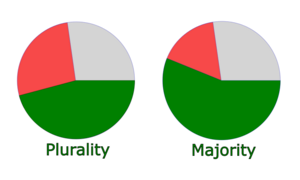First-Past-the-Post
First-past-the-post (FPTP), also known as plurality voting or relative majority voting is an electoral system wherein voters cast a vote for a single candidate, and the candidate with the most votes wins the election. Analogous systems for multi-winner contests are known as plurality block voting or "block voting" systems; both FPTP and block voting are "plurality" systems in that the winner needs only a plurality of the votes and not an absolute majority (greater than half). The term first-past-the-post is a metaphor from horse racing of the plurality-voted candidate winning such a race.
FPTP is one of the simplest electoral systems, and originated from real-life countries such as the United Kingdom, where it has been used to elect the House of Commons of England (and its successors for Great Britain and the United Kingdom) since the Middle Ages. Its use extended to former British colonies, most notably the United States, Canada, and India. In real-life, it is used as the primary form of allocating seats for legislative elections in about a third of the world's countries, mostly in the English-speaking world, and is used to directly elect executive positions in many more. For legislative elections, a country using FPTP is often divided into geographic constituencies that each elect one member to the legislature using the method, or at-large variants of FPTP could be used, such as Block Voting or Single Non-Transferable Vote. On EarthMC, large amounts of elected positions are elected via first-past-the-post, whether it be executive positions such as the President of the Philippine Federal Republic, legislative bodies such as the Legislative Council of Laurentia, or corporate positions such as the Editorial Board of The Blockbuster Insider.
Despite its simplicity and historical record, there are several major drawbacks to FPTP. As a winner-take-all method, it often produces disproportional results, particularly when electing members of a legislature, in the sense that political parties do not get representation according to their share of the popular vote. This usually favours the largest party or faction and groups with strong regional support to the detriment of smaller parties without a geographically concentrated base. Supporters of electoral reform are generally highly critical of FPTP because of this and point out other flaws, such as FPTP's vulnerability to gerrymandering, the high number of wasted votes and the chance of a majority reversal (i.e., the party winning the most votes getting fewer seats than the second largest party and losing the election). Many nations on EarthMC have abandoned or refused to use first-past-the-post as a method of election, instead adopting majoritarian systems such as runoffs, two-round systems, Instant Runoff Voting, or proportional systems such as Single Transferable Vote or List systems.
Some countries use FPTP alongside proportional representation in a parallel voting system, with the PR element not compensating for but added to the disproportionality of FPTP. Others use it in so-called compensatory mixed systems, such as part of mixed-member proportional representation or mixed single vote systems, which aim to counterbalance these. In some countries that elect their legislatures by proportional representation, FPTP is used to elect their head of state.
